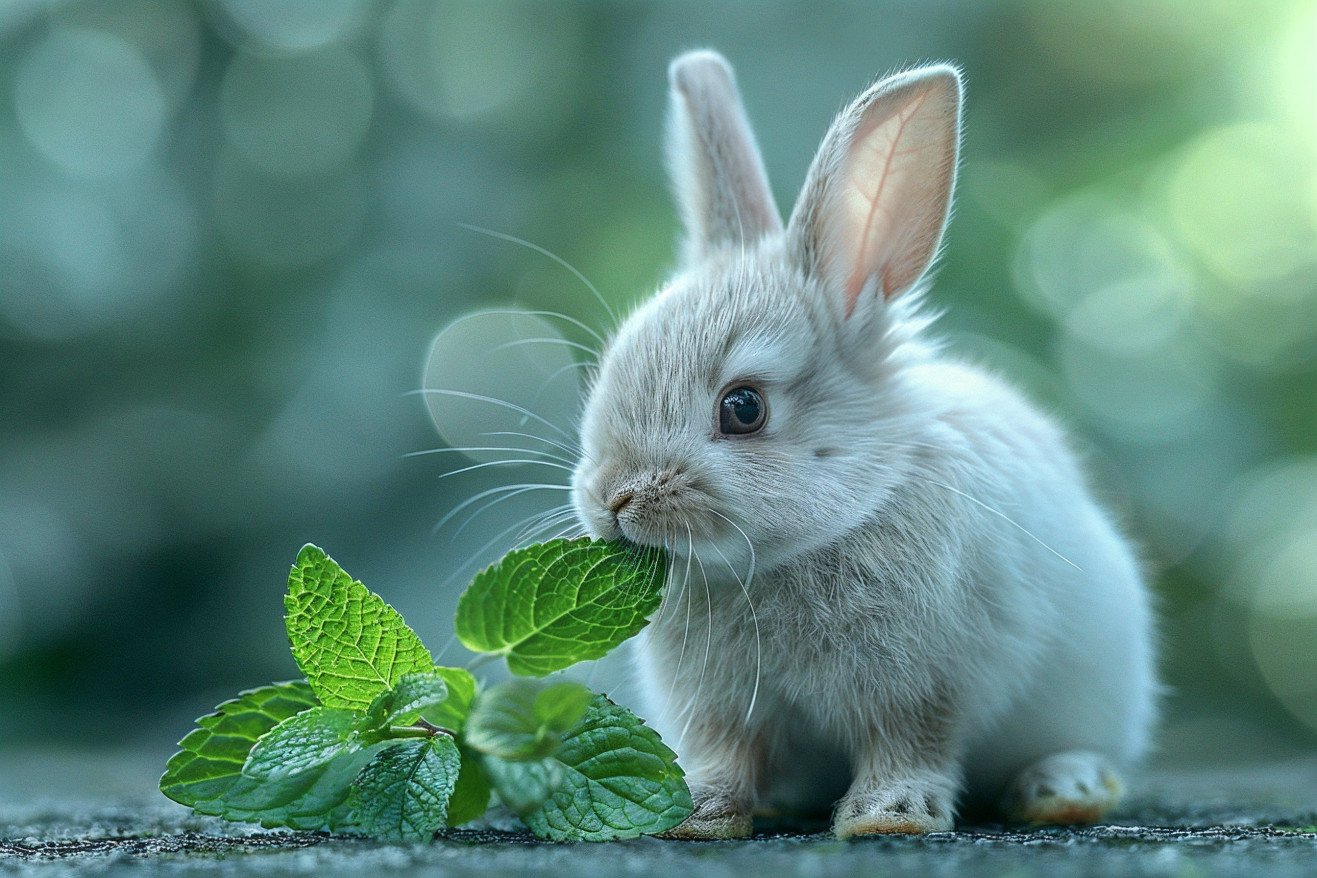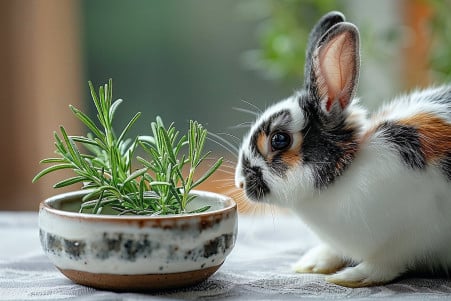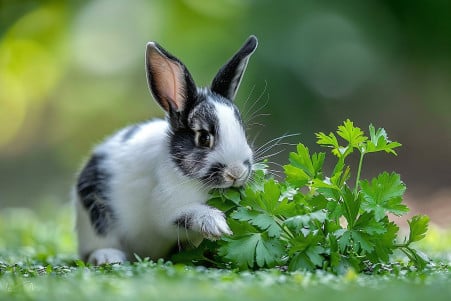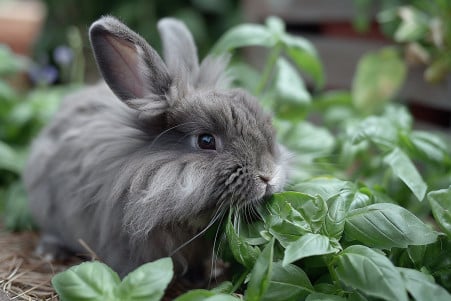Is Mint Safe for Rabbits to Eat? What You Need to Know
30 May 2024 • Updated 30 May 2024

Mint can be a delicious, refreshing snack for rabbits, but there are some important things to consider when it comes to your rabbit's health. Fresh mint is safe for rabbits to eat in small amounts, and it can be fed to them as an occasional treat. However, the strong smell and oils in mint can lead to digestive issues if it's fed to rabbits in excess. Always be sure to wash mint thoroughly and introduce new foods to your rabbit slowly so you can keep an eye out for any adverse reactions.
This article will take a deep dive into the scientific and veterinary literature to discuss the potential nutritional benefits of feeding mint to rabbits, as well as the potential risks and how to make sure that you're feeding it to your rabbit in a way that's safe. By the end of this article, you'll have all the information you need to decide whether or not you want to add mint to your rabbit's diet.
Can rabbits eat mint?
Nutritional Benefits of Mint for Rabbits
Mint leaves can provide a rabbit with a number of important health benefits. According to PetKonnect, mint is rich in proteins, minerals, carbohydrates, and vitamins such as vitamin A, potassium, and iron, which are important for the immune system. The antioxidants in mint can also help protect rabbits from infections and diseases.
Le Petit Rongeur points out that mint is a good source of calcium and iron, which are important for bone health and blood health, respectively. It also has antiseptic and diuretic properties that can help with urinary health. Plus, the scent of mint can help stimulate a rabbit's appetite, which can help encourage them to eat more hay.
Because it contains compounds that can help reduce inflammation and aid in digestion, as shared by Rabbits World, mint can be a great occasional addition to a rabbit's diet when it's fed in the right way. Knowing the vitamins, minerals, and phytonutrients that it contains can help rabbit owners make sure they're feeding it in a way that's most beneficial.
Safe Mint Species and Serving Sizes for Rabbits
The Bunny Lady website notes that most culinary mints, including spearmint, peppermint, and chocolate mint, are safe for rabbits. However, pennyroyal and perilla mint are examples of mint species that are toxic to rabbits and should be avoided.
If you want to feed your rabbit mint, the Rabbits Online Pet Rabbit & Bunny Forum suggests starting with small amounts, such as 2-3 fresh leaves per serving, and then increasing the amount of mint you give your rabbit while watching for any signs of digestive upset. This is also in line with the RSPCA, which explains that you should feed mint in moderation to rabbits because too much can cause diarrhea and other digestive issues.
How to Introduce and Monitor Mint in a Rabbit's Diet
When introducing mint to a rabbit's diet, it's important to start slowly and in small amounts, according to Central Victoria Hay. For example, you can begin by giving a couple of fresh mint leaves to the rabbit and then watch for any signs of digestive upset or allergies. These signs can include diarrhea, gas, a lack of interest in eating, or respiratory issues, according to Healthline.
If the rabbit seems to handle the initial introduction well, you can gradually increase the amount of mint over a period of weeks. However, as the Rabbits Online Pet Rabbit & Bunny Forum points out, you should continue to monitor the rabbit's overall well-being and behavior to make sure the mint isn't causing any problems. This is especially important since rabbits' sensitivity to mint can vary.
How to Grow and Feed Mint to Rabbits
Before giving mint leaves to rabbits, make sure to wash them well to get rid of any dirt, pesticides, or other chemicals, as Rabbits United notes. Fresh mint leaves can be fed as a treat or mixed in with hay or pellets. Dried mint leaves can be sprinkled on top of hay or pellets or mixed in during the winter when fresh mint isn't available.
Mint is a great plant to grow in a rabbit garden, according to ShrubHub, because it's full of essential nutrients. The Rabbit Welfare Association says that mint flowers and stems are safe for rabbits, but the leaves are the most nutritious part of the plant.
Safety Precautions for Mint Extracts and Essential Oils
While fresh mint leaves are safe for rabbits, you should be careful when it comes to more concentrated forms of mint, such as essential oils or extracts. According to Vivorific, some essential oils, including peppermint, are safe for rabbits when used for aromatherapy or as a deterrent, but they should never be ingested. On the other hand, essential oils like clove, oregano, and tea tree are potentially toxic to rabbits and should be avoided.
As noted in a PubMed study, mint oils and extracts can contain compounds like pulegone, which can be toxic to rabbits when ingested in large amounts. The study determined that the concentration of pulegone in mint oils and extracts should be no more than 1% to avoid toxicity.
Because of this, it's important to always talk to your vet before using essential oils or extracts in the vicinity of rabbits. You should never use them on a rabbit's skin or in their food without diluting them properly and getting the go-ahead from your vet since they can be toxic in their concentrated form.
Conclusion: How to Add Mint to a Healthy Rabbit Diet
Mint can be a healthy and safe occasional treat for rabbits as long as it is introduced and fed in moderation as part of a healthy diet. Fresh mint leaves provide a variety of vitamins, minerals, and antioxidants that can help support a rabbit's health.
However, it's important to watch a rabbit's response to mint when it's first introduced and to make sure not to overdo it, as too much of the herb can lead to digestive problems. By making sure to stick to safe varieties, serving sizes, and preparation methods, rabbit owners can ensure that they are able to take advantage of the benefits of adding mint to their pet's diet.
As with any new food, it's best to talk to a vet before adding mint to a rabbit's diet, as they will be able to provide personalized guidance based on the animal's specific dietary requirements.


